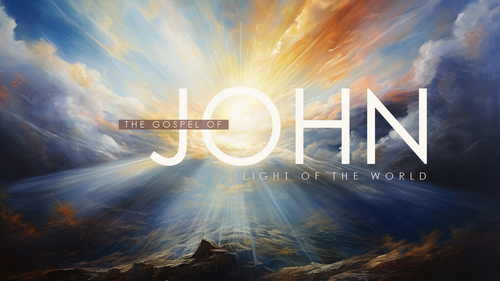John 5:16-30 — Equal with the Father

John 5:16-30 — Equal with the Father
In John 5:13-21, Jesus makes several claims about Himself that highlight His deity. He calls God His Father, making Himself equal with God (v. 18). He claims to have the authority to give life (v. 21). He claims to have the authority to judge (v. 22). He claims to be worthy of the same honor as the Father (v. 23). Jesus is not just a man, He is God.
This is why the church spent the first 300 years battling heresies against the Personhood of Jesus Christ. Why was the Personhood of Jesus Christ the first thing that the church battled with? Did church leadership just want to stifle dissent? The church was fighting for a view of who Jesus is that preserved the Gospel. This is why heresies that attacked the Personhood of Jesus Christ like Ebionism, Arianism, Docetism, Nestorianism, and Eutychianism are not simply theological jargon that just do not matter anymore. Any other view than that Jesus is 1) true God, 2) true Man, 3) one Person, 4) with two natures (both divine and human) means that Jesus could not have taken our place on the cross.
Ebionism said that Jesus was not God. Arianism taught that Jesus was a created being, subordinate to God the Father, namely, He is not fully God. Nestorianism taught that Christ was two distinct persons, one divine and one human, loosely joined together. Docetism taught that Jesus only appeared to be human, denying the reality of His incarnation, namely, Jesus was not human. Eutychianism said that Jesus had one blended nature. The church battled these heresies because they had real implications on the heart of the Gospel, our justification, our sanctification, and the Christian Life.
Justification
Because our sin was against an infinite God, it required an infinite sacrifice to atoned for it. If Jesus is not fully God, His sacrifice on the cross would have been insufficient to atone for our sin. Only God can truly bridge the gap between God and man. If Jesus' humanity was not real, then His death on the cross could not have been a true sacrifice for sin. A phantom death cannot atone for real sins. The core of the Gospel—Christ's atoning death and resurrection—is nullified. If Christ is not one unified person, then which "person" died on the cross? It's difficult to see how His divine nature could have truly suffered for our sin. The atonement becomes fragmented and ineffective.
Sanctification
If Jesus is not fully God, the power available to believers for sanctification is diminished. A lesser Jesus means a lesser access to the Father and the divine power for transformation. Docetism separates Christ's divinity from His humanity, making Him an unattainable and irrelevant example for human life. How can we emulate a phantom? The call to be conformed to the image of Christ loses its meaning. Nestorianism creates a disconnect between the divine and human aspects of Christ, making it difficult to understand how His divine power can work in our human lives. The process of being transformed into Christlikeness is obscured.
Christian Living
Arianism can lead to a diminished view of Jesus' authority and a less compelling motivation for obedience. If Jesus is not truly God, why should we worship Him as such? Our model for perfect humanity is compromised. Docetism can lead to a disregard for the physical world and a denial of the importance of the incarnation. It can also foster a spiritual elitism, where true spirituality is seen as detached from the messiness of human existence. Nestorianism can lead to a confusing and compartmentalized view of the Christian life. How do we relate to the two Christs? Which one do we follow? This undermines a holistic understanding of what it means to follow Christ.
In John 5:16-30, the Lord Jesus clearly asserted that He is equal with the Father with the authority to give life. Has the reality that Jesus Christ is God the Son who became man fully taken hold in your life, heart, soul, mind, and strength?
In John 5:13-21, Jesus makes several claims about Himself that highlight His deity. He calls God His Father, making Himself equal with God (v. 18). He claims to have the authority to give life (v. 21). He claims to have the authority to judge (v. 22). He claims to be worthy of the same honor as the Father (v. 23). Jesus is not just a man, He is God.
This is why the church spent the first 300 years battling heresies against the Personhood of Jesus Christ. Why was the Personhood of Jesus Christ the first thing that the church battled with? Did church leadership just want to stifle dissent? The church was fighting for a view of who Jesus is that preserved the Gospel. This is why heresies that attacked the Personhood of Jesus Christ like Ebionism, Arianism, Docetism, Nestorianism, and Eutychianism are not simply theological jargon that just do not matter anymore. Any other view than that Jesus is 1) true God, 2) true Man, 3) one Person, 4) with two natures (both divine and human) means that Jesus could not have taken our place on the cross.
Ebionism said that Jesus was not God. Arianism taught that Jesus was a created being, subordinate to God the Father, namely, He is not fully God. Nestorianism taught that Christ was two distinct persons, one divine and one human, loosely joined together. Docetism taught that Jesus only appeared to be human, denying the reality of His incarnation, namely, Jesus was not human. Eutychianism said that Jesus had one blended nature. The church battled these heresies because they had real implications on the heart of the Gospel, our justification, our sanctification, and the Christian Life.
Justification
Because our sin was against an infinite God, it required an infinite sacrifice to atoned for it. If Jesus is not fully God, His sacrifice on the cross would have been insufficient to atone for our sin. Only God can truly bridge the gap between God and man. If Jesus' humanity was not real, then His death on the cross could not have been a true sacrifice for sin. A phantom death cannot atone for real sins. The core of the Gospel—Christ's atoning death and resurrection—is nullified. If Christ is not one unified person, then which "person" died on the cross? It's difficult to see how His divine nature could have truly suffered for our sin. The atonement becomes fragmented and ineffective.
Sanctification
If Jesus is not fully God, the power available to believers for sanctification is diminished. A lesser Jesus means a lesser access to the Father and the divine power for transformation. Docetism separates Christ's divinity from His humanity, making Him an unattainable and irrelevant example for human life. How can we emulate a phantom? The call to be conformed to the image of Christ loses its meaning. Nestorianism creates a disconnect between the divine and human aspects of Christ, making it difficult to understand how His divine power can work in our human lives. The process of being transformed into Christlikeness is obscured.
Christian Living
Arianism can lead to a diminished view of Jesus' authority and a less compelling motivation for obedience. If Jesus is not truly God, why should we worship Him as such? Our model for perfect humanity is compromised. Docetism can lead to a disregard for the physical world and a denial of the importance of the incarnation. It can also foster a spiritual elitism, where true spirituality is seen as detached from the messiness of human existence. Nestorianism can lead to a confusing and compartmentalized view of the Christian life. How do we relate to the two Christs? Which one do we follow? This undermines a holistic understanding of what it means to follow Christ.
In John 5:16-30, the Lord Jesus clearly asserted that He is equal with the Father with the authority to give life. Has the reality that Jesus Christ is God the Son who became man fully taken hold in your life, heart, soul, mind, and strength?
Posted in Gospel of John
Recent
John 20:18–31 — Believing is Seeing
January 16th, 2026
John 20:1–17 — Love Turns Grief into a Mission
January 10th, 2026
John 17:20–26 — Jesus Prayer for All Believers
December 5th, 2025
John 17:1-26 — The High Priestly Prayer of Jesus
November 21st, 2025
John 15:5 — "I AM the Vine"
October 3rd, 2025
Archive
2025
October
2024
February
March
April
May
July
October
November
December
Advent 2024 Devotion: December 2Advent 2024 Devotion: December 3Advent 2024 Devotion: December 4Advent 2024 Devotion: December 5Advent 2024 Devotion: December 6John 3:16-21 — For God So Loved the WordAdvent 2024 Devotion: December 7Advent 2024 Devotion: December 8Advent 2024 Devotion: December 9Advent 2024 Devotion: December 10Advent 2024 Devotion: December 11Advent 2024 Devotion: December 12Advent 2024 Devotion: December 13Advent 2024 Devotion: December 14Advent 2024 Devotion: December 15Advent 2024 Devotion: December 16Advent 2024 Devotion: December 17Advent 2024 Devotion: December 18Advent 2024 Devotion: December 19Advent 2024 Devotion: December 20Advent 2024 Devotion: December 21Advent 2024 Devotion: December 22Advent 2024 Devotion: December 23Advent 2024 Devotion: December 24Advent 2024 Devotion: December 25
2023
January
February
March
April
May
September
